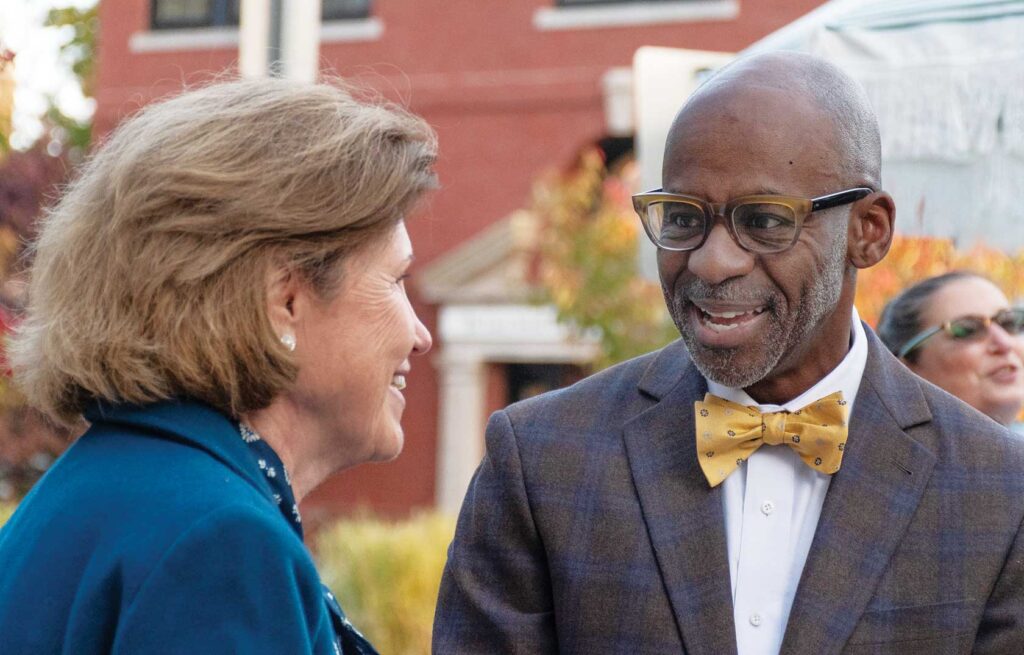
A new addiction treatment program in Roxbury will attempt to fill a citywide gap in substance abuse disorder care.
The clinical stabilization services (CSS) program for men at the Dimock Center in Roxbury will be the only program of its kind in the Boston.
The program, a new facility for which broke ground Oct. 24, will offer an intermediate step between detoxification clinics — where patients receive support to manage the biological processes of withdrawal — and a residential phase of treatment, where patients focus on things like family stabilization and job preparation.
The Dimock Center is aiming to have the program fill a gap not only in services more broadly available, but also within its own offerings. Its campus already houses detox and residential services, as well as a CSS program for women, providing Dimock calls a “continuum of care” designed to keep patients in treatment and from relapsing.
The $18 million addition to the Center’s campus, being financed with a combination of public and private funds, is expected to open in June 2025.
Dr. Charles Anderson, president and CEO of Dimock, said he hopes the new program allowing male patients to move directly from detox to the next level of service onsite will give patients a less disjointed or fragmented experience.
“The road to recovery is not one where you start part of the road over here and then you transplant someplace else to kind of piece it together to create part of your road there, then going somewhere else to piece it together,” he said. “There is one continuous path when they come here, which makes a huge difference.”
Anderson said he has seen patients struggle with having to shift from a detox program in Boston to a stabilization program outside of the city. At the groundbreaking for the program, he recalled when he first joined Dimock in 2021 meeting a patient in the detox program who was excited about entering a CSS program, until he found out it wasn’t in Boston.

Boston Chief of Human Services José Massó speaks at the groundbreaking of the Dimock Center’s new men’s clinical stabilization services program, Oct. 24. The program will serve patients after they finish time in detox for addiction as a next step to try to keep them from relapsing. BANNER PHOTO
“I could see the look in his eyes, which reminded me that that was going to be a difficult step for him. It was probably going to contribute to this constant cycle that he found himself in, because he was not able to continue his treatment right here in his community,” Anderson said. “That’s why this is so important, because he now would be able to look from his window, right there at detox, right across the street and see the next stage in his treatment journey.”
Greg Davis, who runs Metro Boston Alive, a substance abuse resource center in Nubian Square, said he’s excited to see the program open but is waiting to see who is going to fill the beds.
Once the new program opens, Davis said, the Dimock Center should make sure its program works to serve a diverse group of residents. He said he wants to see the program filled with Black and brown patients, having seen other programs that aren’t.
“Every time we try to get someone into substance abuse services — whether it be detox or halfway houses — they’re filled up,” Davis said.
At the groundbreaking, José F. Massó, the city’s chief of human services, said he sees the new program as an opportunity to increase diversity in addiction treatment services.
“City, state, nonprofit and private partnerships are critical to addressing the opioid crisis in Boston from all angles. Offering a clinical stabilization services unit for men in Boston at the Dimock Center, where it can be integrated with the community health center’s existing high-quality health care and human services offerings is an important step in our efforts to make recovery programs more equitable and accessible in the city,” Massó said.
Anderson said the Dimock Center has had a collaborative relationship with the city in efforts to address the ongoing challenges facing Boston residents around drug use and homelessness centered at Massachusetts Avenue and Melnea Cass Boulevard, and that the health center is prepared to be a resource with its new space.
He also sees the new facility on the center’s Roxbury campus as a way to help people stay in their community as they access addiction treatment services.
“There are really barriers when it comes to things like leaving my community for services, and that fragmentation (of care) especially,” Anderson said. “If I’ve got to bounce around to different places, and I’m going outside of my community, that creates a barrier.”
He said he also hopes that Dimock’s 160-year-long roots in the community will help people face some of the stigma that surrounds getting treatment for substance abuse disorder.
“Almost everybody in the community has either received services here or worked here, so it’s home, from that perspective,” Anderson said. “That’s why I think — I know — that our unique ability to add this capacity in the community has a much better chance of serving more of our individuals right here in the community.”






